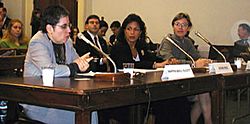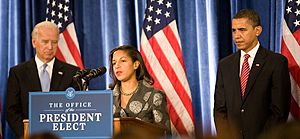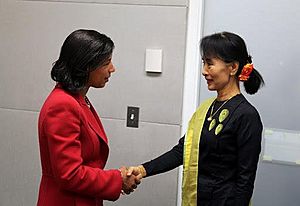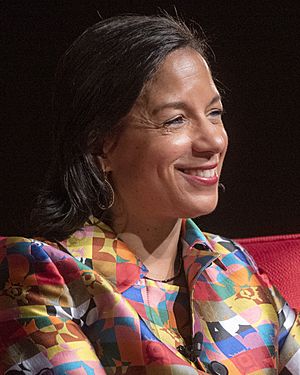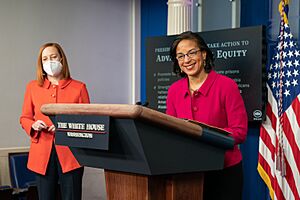Susan Rice facts for kids
Quick facts for kids
Susan Rice
|
|
|---|---|
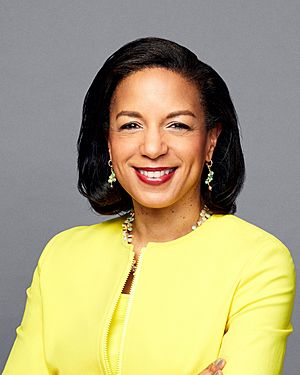
Official portrait, 2021
|
|
| 22nd Director of the Domestic Policy Council | |
| In office January 20, 2021 – May 26, 2023 |
|
| President | Joe Biden |
| Preceded by | Brooke Rollins (acting) |
| Succeeded by | Neera Tanden |
| 23rd United States National Security Advisor | |
| In office July 1, 2013 – January 20, 2017 |
|
| President | Barack Obama |
| Deputy | Antony Blinken Avril Haines |
| Preceded by | Thomas E. Donilon |
| Succeeded by | Michael Flynn |
| 27th United States Ambassador to the United Nations | |
| In office January 26, 2009 – June 30, 2013 |
|
| President | Barack Obama |
| Deputy | Brooke Anderson Rosemary DiCarlo |
| Preceded by | Zalmay Khalilzad |
| Succeeded by | Samantha Power |
| 12th Assistant Secretary of State for African Affairs | |
| In office October 14, 1997 – January 20, 2001 |
|
| President | Bill Clinton |
| Preceded by | George Moose |
| Succeeded by | Walter H. Kansteiner III |
| Personal details | |
| Born |
Susan Elizabeth Rice
November 17, 1964 Washington, D.C., U.S. |
| Political party | Democratic |
| Spouse |
Ian Cameron
(m. 1992) |
| Children | 2 |
| Parents | Emmett J. Rice (father) Lois Dickson Rice (mother) |
| Education | Stanford University (BA) New College, Oxford (MPhil, DPhil) |
| Signature | |
Susan Elizabeth Rice (born November 17, 1964) is an American diplomat and government official. She is a member of the Democratic Party. Rice has held several important roles in the U.S. government.
From 2021 to 2023, she was the 22nd director of the United States Domestic Policy Council. Before that, she served as the 27th U.S. ambassador to the United Nations from 2009 to 2013. She was also the 23rd U.S. national security advisor from 2013 to 2017.
Rice was born in Washington, D.C. She studied at Stanford University and New College, Oxford. At Oxford, she was a Rhodes Scholar and earned a doctorate degree. She worked for President Bill Clinton on the National Security Council staff from 1993 to 1997. She also served as the assistant secretary of state for African affairs from 1997 to 2001. At 32, she was the youngest person to hold this position. During her time, U.S. policy towards Africa changed. This included new laws to help African trade and increased focus on fighting HIV/AIDS.
Rice also advised Democratic presidential candidates like Barack Obama. After Obama won the 2008 election, she became ambassador to the United Nations. The Senate approved her nomination in January 2009. At the UN, Rice worked to promote human rights and fight poverty. She also focused on climate change and LGBT and women's rights. She helped the U.S. join important agreements like the Nuclear Non-Proliferation Treaty. She also supported Israel at the Security Council and pushed for strong actions against Iran and North Korea.
In 2013, President Obama named her national security advisor. In this role, she supported U.S. efforts on the Iran nuclear deal of 2015. She also helped with the response to the Ebola epidemic. Her work included reopening relations with Cuba and the Paris Agreement on climate change. In 2021, Rice joined the Biden administration as director of the Domestic Policy Council.
Contents
- Early Life and Education
- Early Career
- Working for President Clinton (1993–2001)
- Work Outside Government (2001–2008)
- U.S. Ambassador to the United Nations (2009–2013)
- U.S. National Security Advisor (2013–2017)
- After the Obama Administration (2017–2021)
- Director of Domestic Policy Council (2021–2023)
- Personal Life
- Honors and Awards
- See also
Early Life and Education
Rice was born in Washington D.C. Her mother, Lois Rice, was an education policy expert. She helped create the federal Pell Grant system. Her father, Emmett J. Rice, was an economics professor at Cornell University. He was also the second Black governor of the Federal Reserve System. Her parents divorced when she was ten.
Rice was a talented student and athlete. She was president of the student government at National Cathedral School. She was also the top student in her graduating class. She attended Stanford University and earned a degree in history in 1986. She received a Truman Scholarship and a National Merit Scholarship.
Rice then went to New College, Oxford in England as a Rhodes Scholar. She earned two advanced degrees in International Relations. Her doctoral paper was about how the Commonwealth helped bring peace in Zimbabwe. This paper was recognized as the best in international relations in the UK. While at Oxford, Rice also played on the women's basketball team.
Early Career
Rice worked as a foreign policy helper for Michael Dukakis during his 1988 presidential campaign. From 1990 to 1992, she was a management consultant at McKinsey & Company. She worked in their Toronto office.
Working for President Clinton (1993–2001)
Rice held several roles in the Clinton administration. She worked on the National Security Council (NSC) from 1993 to 1997. She focused on international organizations and African affairs. From 1997 to 2001, she was the Assistant Secretary of State for African Affairs. During this time, U.S. policy towards Africa changed. This included the African Growth and Opportunity Act. The U.S. also supported democratic changes in South Africa and Nigeria. There was also a greater focus on fighting the HIV/AIDS pandemic.
National Security Council Work
During the 1994 Rwandan genocide, Rice later said that mistakes were made. She felt a strong need to make up for those mistakes. She stated that if she ever faced such a crisis again, she would push for strong action.
Some people claimed that in 1997, Sudan offered to share information about Osama bin Laden. They said Rice and others stopped U.S. officials from working with Sudan. However, investigations by the Joint Congressional Inquiry into 9/11 and the 9/11 Commission found no proof of this.
Assistant Secretary of State for African Affairs
Secretary of State Madeleine Albright encouraged President Clinton to appoint Rice as Assistant Secretary of State for African Affairs in 1997. She was easily approved for the role.
In 1996, there was an invasion of Zaire (now the Democratic Republic of the Congo). Rice was said to have believed that any change was better than the dictator Mobutu Sese Seko.
In July 1998, Rice was part of a U.S. group that visited Nigerian president-elect Basorun Moshood Kashimawo Olawale Abiola. He sadly had a fatal heart attack during this meeting.
Rice supported U.S. efforts to achieve peace agreements in Congo and Sierra Leone. She also played a big part in peace talks between Ethiopia and Eritrea. These talks led to the Algiers Agreement in 2000, which ended their conflict. For her work, she received an award for helping create peaceful relationships between nations.
Work Outside Government (2001–2008)
From 2001 to 2002, Rice worked at a company called Intellibridge. From 2002 to 2009, she was a senior expert at the Brookings Institution. There, she focused on U.S. foreign policy, countries facing challenges, and global poverty.
Two of her colleagues at Brookings said that Rice was against the 2003 invasion of Iraq. Rice herself wrote in her book that she was one of the few experts at Brookings who openly opposed the war. She saw it as a dangerous distraction from fighting Al Qaeda.
During the 2004 presidential campaign, Rice advised John Kerry on foreign policy. She also advised Barack Obama during his 2008 presidential campaign. She was one of the first important foreign policy experts to join Obama's team.
In November 2008, Rice was named to the advisory board for the team preparing for Obama's presidency.
U.S. Ambassador to the United Nations (2009–2013)
On December 1, 2008, President-elect Obama announced he would nominate Rice to be the U.S. ambassador to the United Nations. This position was made part of the President's main team again. Rice was approved by the Senate in January 2009. She became the second-youngest person and the first Black woman to represent the U.S. at the UN.
As ambassador, Rice worked to promote human rights and fight poverty. She made climate change and women's rights important global issues. She also helped the U.S. commit to agreements like the Nuclear Non-Proliferation Treaty. Rice strongly defended Israel at the Security Council. She also led efforts to put strong actions against Iran and North Korea because of their nuclear programs.
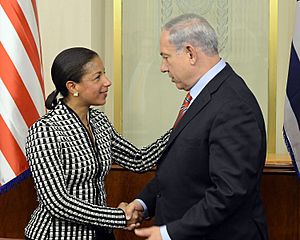
Some diplomats at the Security Council found her negotiating style direct. Others said these criticisms might have been due to sexism. Many saw her as an effective policymaker because of her close relationship with the U.S. president.
Libyan Civil War
During the 2011 Libyan Civil War, Rice spoke strongly against Colonel Muammar Gaddafi. She criticized his actions against his own people. Rice, along with other U.S. officials, pushed for the UN to create a no-fly zone over Libya. This would allow military actions to protect civilians.
In March 2011, the UN Security Council voted for United Nations Security Council Resolution 1973. This resolution allowed countries to take action to protect civilians in Libya. Rice played a big part in getting this resolution approved.
Syrian Civil War
In January 2012, Russia and China stopped a Security Council resolution about the Syrian Civil War. This resolution called for Syrian president Bashar al-Assad to step down. Rice strongly criticized both countries. She said they prevented a peaceful solution to the conflict.
2012 Benghazi Attack
On September 11, 2012, a U.S. diplomatic building in Benghazi, Libya, was attacked. Four Americans died, including the U.S. ambassador. A few days later, Rice appeared on several TV shows to discuss the attacks. She used information from a CIA memo.
The CIA information suggested the attack was a spontaneous protest against an anti-Muslim video. Later, there were questions about whether Rice had misled the public. However, many investigations by Congress found no evidence that she or any other official intentionally misled the American people. The investigations concluded that CIA analysts had made errors in their initial assessment.
Because of the controversy, Rice withdrew her name from consideration for Secretary of State in December 2012.
U.S. National Security Advisor (2013–2017)
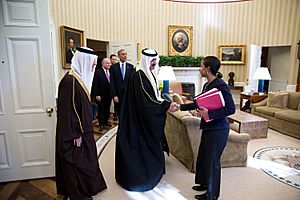
Rice was chosen to become the national security advisor in June 2013. This position does not need Senate approval. She started the role in July 2013. During her time, she supported major U.S. efforts on the Iran nuclear deal of 2015. She also helped with the Ebola epidemic response. Other key efforts included reopening relations with Cuba and fighting the Islamic State. She also worked on the Paris Agreement on climate change.
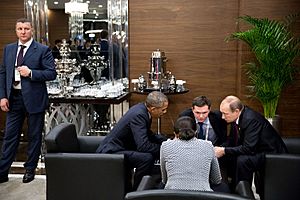
In 2015, Rice said the U.S. was working on an "ambitious yet achievable agenda" globally. She believed U.S. leadership was key to success on issues like Ebola and Iran's nuclear program.
Middle East Policy
Rice criticized human rights violations in Egypt. She condemned the August 2013 Rabaa massacre, where many people died during protests. She led a review of U.S. aid to Egypt, which led to some military aid being stopped.
Rice disagreed with President Obama's decision to ask Congress for approval to strike Syria's chemical weapons sites. She thought the U.S. should act without Congress. Later, she worked with others to find a diplomatic solution with Russia. This led to United Nations Security Council Resolution 2118. This resolution made Syria destroy its declared chemical weapons.
In May 2014, Rice visited Israel to discuss nuclear talks with Iran. She supported Israel's right to defend itself during the 2014 Israel–Gaza conflict. In 2015, Rice criticized Israeli Prime Minister Benjamin Netanyahu for speaking to Congress about Iran's nuclear program without telling the Obama administration first. In 2016, she helped negotiate a new agreement for $38 billion in military aid to Israel. This was the largest aid package in Israel's history.
Rice opposed a planned attack on the port city of Al Hudaydah in Yemen. She personally called a leader from the UAE to stop the attack.
Africa Policy
Rice supported South Sudanese independence and early U.S. aid to its government. When the South Sudanese Civil War started in 2013, the U.S. continued to support the government. Later, Rice joined calls for an arms embargo against South Sudan in 2016.
China Relations
In a 2015 speech about China–United States relations, Rice talked about the problems of Chinese intelligence operations in the United States. She said it was a serious concern for the U.S. economy and national security.
After the Obama Administration (2017–2021)
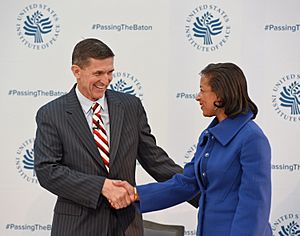
After leaving government, Rice became a visiting research fellow at American University. She also joined the board of directors at Netflix in March 2018.
Unmasking Investigations
In 2017, reports said that Rice had asked for the identities of some Americans to be revealed in intelligence reports. These reports were related to Donald Trump's campaign and transition. This process is called "unmasking." Intelligence agencies must approve such requests if there's a valid need to know. Rice said she asked for identities to understand the intelligence better, not for political reasons.
Some Republicans called for an investigation into the unmasking. However, congressional intelligence sources said Rice's requests were "normal and appropriate" for a national security advisor. In 2017, Rice's successor as national security advisor, H. R. McMaster, also concluded that Rice did nothing wrong.
In 2020, an inquiry was launched to examine unmasking by the Obama administration. This inquiry found no evidence that any unmasking requests were made for improper reasons during the 2016 election period or transition.
Political Views
Rice has criticized the U.S.'s close relationship with Saudi Arabia. She pointed to human rights issues and their actions in Yemen. Rice also criticized Trump's decision to remove U.S. troops from Syria. She believed this allowed Turkey to invade northern Syria and attack Kurdish forces.
Rice has also spoken against Israeli plans to annex parts of the West Bank. She believes this would make it harder to achieve a two-state solution for peace.
Director of Domestic Policy Council (2021–2023)
In July 2020, it was reported that Rice was being considered as Joe Biden's running mate for the 2020 presidential election. However, Kamala Harris was chosen.
In November 2020, Rice was considered for Secretary of State in the Biden Administration. Instead, President Biden chose her to lead the Domestic Policy Council. This was a surprise to some because her background was mostly in foreign policy.
On April 24, 2023, President Biden announced that Rice would leave her position as director of the Domestic Policy Council on May 26, 2023. She highlighted her work on domestic and national security policies during her time at the White House.
Personal Life
Rice married Ian Officer Cameron on September 12, 1992. They met at Stanford University and have two children.
Even though they share the same last name and have held similar jobs, Susan Rice and Condoleezza Rice are not related.
Honors and Awards
In 2002, Rice was honored by Stanford's Black Alumni Hall of Fame. In 2017, the President of France named Rice a commander of the Legion of Honour. This was for her contributions to relations between France and the U.S.
Foreign Honors
| Country | Date | Decoration | Post-nominal letters |
|---|---|---|---|
| 2017 – Present | Commander of the Legion of Honour |
Scholastic Achievements
- University Degrees
| Location | Date | School | Degree |
|---|---|---|---|
| 1986 | Stanford University | Honors Bachelor of Arts (BA) in History | |
| 1988 | New College, Oxford | Master of Philosophy (M.Phil.) in International Relations | |
| 1990 | New College, Oxford | Doctor of Philosophy (D.Phil.) in International Relations |
- Fellowships and Positions
| Location | Date | School | Position |
|---|---|---|---|
| 2014 – Present | New College, Oxford | Honorary Fellow | |
| 2017 – Present | The School of International Service at American University | Distinguished Visiting Research Fellow | |
| 2017 – Present | The Belfer Center for Science and International Affairs at Harvard University | Senior Fellow |
Honorary Degrees
| Location | Date | School | Degree | Gave Commencement Address |
|---|---|---|---|---|
| 2010 | Spelman College | Doctorate | Yes | |
| 2012 | Howard University | Doctor of Laws (LL.D) | No | |
| 2018 | Bowdoin College | Doctor of Laws (LL.D) | No |
Memberships and Fellowships
| Location | Date | Organisation | Position |
|---|---|---|---|
| 2002 – 2009 | Brookings Institution | Senior Fellow |
See also
 In Spanish: Susan Rice para niños
In Spanish: Susan Rice para niños
- List of African-American United States Cabinet members
- List of female United States Cabinet members
 | Victor J. Glover |
 | Yvonne Cagle |
 | Jeanette Epps |
 | Bernard A. Harris Jr. |


